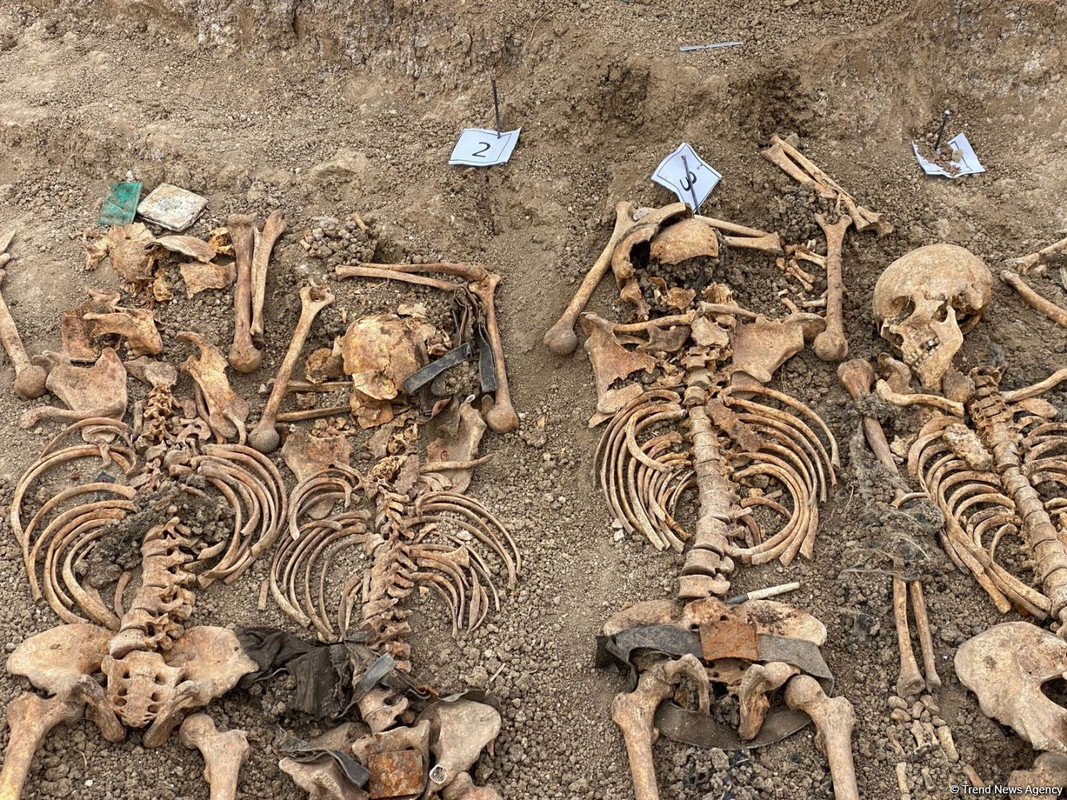A report on Azerbaijanis who went missing during the First Karabakh War, by Commissioner for Human Rights (Ombudsman) of Azerbaijan Sabina Aliyeva, revealed that tens of Azerbaijanis were killed in Armenian captivity.
According to the report, letters submitted by the International Committee of the Red Cross (ICRC) in 1998-2001 mention the names of 54 captive Azerbaijanis in Armenia. They were reported to be alive during the visits by ICRC representatives to the sites where they were being held, in Armenian territory and in the once-occupied Azerbaijani lands.
“However, those 54 people confirmed to be alive were later killed by the military and political leadership of Armenia. Only 17 bodies were returned, of which six were women, and 33 people were reported to have died in detention, but their remains were not returned, and the fate of 4 people was not reported at all. This is a serious violation of human rights,” the Ombudsman’s report says.
It adds that there are reports of the presence of multiple mass and individual graves in the liberated territories of Azerbaijan, including in Khojavand, Kalbajar, Aghdam, and Fuzuli regions, as well as around the city of Shusha.
Such graves have been discovered so far in the villages of Bashlibel in Kalbajar, Edilli in Khojavand, Farrukh in Khojaly, Sarıjali in Aghdam region, Seyidahmadli in Fuzuli region and other settlements of the mentioned regions. The discovered mass graves and human remains testify to brutal tortures against the Azerbaijani captives before their murder and burial en masse.
The report further elaborates that Azerbaijan discovered nearly 500 human remains in mass graves in the liberated lands since 2020.
The most recent mass grave in the liberated lands of Azerbaijan was discovered on August 15. Armenians disposed of bodies of Azerbaijani captives and hostages who died due to torture in a pit containing sewage, on the grounds of Shusha prison, according to Zaur Ismayilov, a representative of the State Commission on Prisoners of War, Hostages, and Missing Persons.
Ismayilov revealed that during excavations carried out between August 1 and 15, the human remains of 17 individuals were discovered on the premises of Shusha prison.
Moreover, in an appeal submitted to international organizations on August 30 – the International Day of the Victims of Enforced Disappearances – Ombudsman Aliyeva stated that the fate of nearly 4,000 Azerbaijanis who went missing in the First Karabakh War in 1991-1994 is still unknown as the government of Armenia refuses to share relevant information.
Following the dissolution of the Soviet Union in 1991, Armenia launched a full-scale military campaign against Azerbaijan, resulting in the longest and deadliest war in the South Caucasus region. The war ended in a ceasefire in 1994, with Armenia forcibly occupying 20 percent of Azerbaijan’s internationally recognized territories. This occupation led to the deaths of over 30,000 Azerbaijanis and the expulsion of one million others in a brutal ethnic cleansing campaign conducted by Armenia.
Around 4,000 Azerbaijanis went missing during the First Karabakh War. It is widely believed that the vast majority of them were systematically killed and buried in mass graves by Armenian forces.
On September 27, 2020, the conflict between Armenia and Azerbaijan escalated when Armenian forces in the occupied Azerbaijani lands shelled military positions and civilian settlements of Azerbaijan. In a counter-attack that lasted 44 days, Azerbaijani forces liberated over 300 settlements, including the cities of Jabrayil, Fuzuli, Zangilan, Gubadli, and Shusha, effectively ending the nearly 30-year-long illegal Armenian occupation. The war concluded with a tripartite statement signed by Armenia, Azerbaijan, and Russia on November 10, 2020. Under this statement, Armenia also returned the occupied districts of Aghdam, Kalbajar and Lachin to Azerbaijan.







 President Ilham Aliyev shed light on the evolving contours of the peace process with Armenia during an international conference in Baku this week. ...
President Ilham Aliyev shed light on the evolving contours of the peace process with Armenia during an international conference in Baku this week. ...
 Azerbaijan and Armenia started the process of demarcation of their border on Tuesday, with the installation of the first border markers based on ge...
Azerbaijan and Armenia started the process of demarcation of their border on Tuesday, with the installation of the first border markers based on ge...
 Iranian President Ebrahim Raisi expressed Tehran’s readiness to participate in significant development projects in Sri Lanka during the inauguratio...
Iranian President Ebrahim Raisi expressed Tehran’s readiness to participate in significant development projects in Sri Lanka during the inauguratio...
 As the conflict between Ukraine and Russia escalates, the strategic importance of Kharkiv, Ukraine's second-largest city, has come sharply into focus.
As the conflict between Ukraine and Russia escalates, the strategic importance of Kharkiv, Ukraine's second-largest city, has come sharply into focus.
 Iran and Pakistan have signed eight cooperation documents in various fields, and agreed to strengthen ties to fight terrorism in the region.
Iran and Pakistan have signed eight cooperation documents in various fields, and agreed to strengthen ties to fight terrorism in the region.



